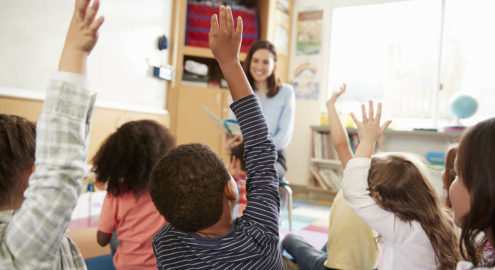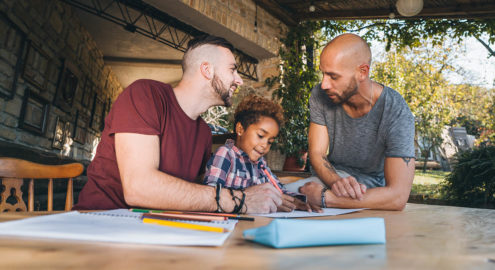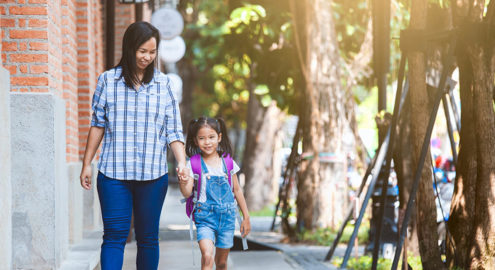How Does Building Relationships Help Students With Diverse Family Needs
Skip to principal content
What Are They?
Researchers have constitute that the key to making the family-customs-school relationship a success is by because information technology a partnership of equals. In other words, educators and families from all backgrounds are seen and valued equally experts in a kid's education. And community members are viewed every bit helpful contributors and supporters of schools.
This partnership is congenital on shared values and emphasizes the strengths that all stakeholders bring to the table. The trust and respect that is fostered helps to cultivate a sense of belonging in the school customs among students and their families, which in plow creates a caring school climate.
A school dedicated to building strong partnerships with families and communities asks families at every parent-teacher conference nigh their expectations for their kid's education. In improver, they honor the cultural backgrounds of families through potluck dinners, whole school celebrations, and by providing opportunities for families to share their stories about their ain educational experiences with teachers, students, and the whole school community. Schools welcome community organizations to these events and invite them to participate and share their knowledge and resources about things like afterwards-schoolhouse programs, arts and athletic events, and volunteering opportunities.
Positive schoolhouse-family partnerships can too help cultivate students' social and emotional well-beingness through methods that build relationships and through practical hands-on means for families to get involved in their child's education.
Relationally, schools tin can build strong partnerships with parents through two-way advice, by collaborating on what'southward best for each student, and cultivating positive relationships between teachers and parents.
A middle school encourages school-family relationships by request parents at the beginning of the year for their preferred method of advice, e.g., text, e-mail, telephone, paper. Teachers and then utilise those preferences to create personal and classroom protocols for communicating with parents.
Practically, offering families methods for reinforcing social and emotional skills at home and suggesting ways for caregivers to partner with teachers can improve students' well-being.
An simple school that is interested in adopting an SEL program forms a committee that includes family members of students from a multifariousness of cultural backgrounds, and they provide input on the relevance and/or cultural responsiveness of particular SEL skills. Afterwards choosing a curriculum, the schoolhouse regularly texts or emails SEL tips to families then that they may reinforce the SEL skills at domicile. Schools as well invite all families to requite feedback to the teachers almost the effectiveness of the skill and the relevance to their families' background.
Schools can also engage customs-based organizations such as businesses, colleges, religious organizations, libraries, and social agencies, to offering programs that develop students' strengths and social-emotional skills.
To cultivate students' civic engagement, a high school partners with local businesses, the city quango, and libraries to create opportunities for students to get more involved in their communities. During students' advisory meetings every week, they discuss the partnership challenges that come upwardly for them and learn valuable social and emotional skills to help them handle these challenges.
Why Are They Important?
It takes a village to raise a child, and science is proving this. Here are a few findings:
Students do better in school when their families are involved in their teaching.
- Students whose families participate in their education have higher levels of attendance, homework completion, bookish outcomes, and graduation rates.
- Students' attitudes towards school, cocky-esteem, and beliefs all improve when their families participate in their education.
- When schools suggest applied ways that families can back up their children's learning at habitation, students do better.
- Families from all cultural backgrounds, education, and income levels tin positively influence student success.
Family-schoolhouse partnerships meliorate students' well-being.
- A meta-analysis of 117 studies found that when families are invited to participate and partner with schools in their children'south education, students' mental health and social-emotional outcomes improve.
Family unit-customs-school partnerships that focus on building relationships, peculiarly with various families, create the weather condition that back up student achievement.
- School factors that cultivate these strong relationships include a welcoming attitude that encourages involvement and a focus on the specific needs of families and the community.
- Constructive partnerships are strengths-based and power is shared amidst all stakeholders.
Exercise Collections
Practices

Common Beliefs Survey: Teaching Racially and Ethnically Diverse Students
Teachers examine 13 specific beliefs near ethnically diverse students, reflect on those beliefs and outline action steps for better serving their students.

Dimensions of Departure and Similarity Reflection
Teachers reflect on and discuss the various dimensions and impact of their identities on their relationships with students and their families.

Making Families Experience Welcome
Simple ways for teachers, principals, and staff members to help families of all backgrounds experience welcome in the school community

Mindful Reflection Process for Developing Culturally Responsive Practices
Teachers engage in a mindful reflection process that creates space for checking their assumptions virtually pupil behavior.

Standing Upwardly Against Bigotry
Students explore real-world examples to assist them place peaceful ways to answer to bigotry.

Stepping Upwards Family Date Through Dance
Ideas for promoting family involvement through the joy of dance

Have Home Skill: Creating Space for All Emotions
Strategies for parents and caregivers to prove their children they love them by helping them to procedure their emotions

Have-Home Skill: Creating Happy Memories
Students spend a mean solar day or ii doing a variety of meaningful activities.

Accept-Domicile Skill: Deliberate Practice for Students
Strategies for parents and caregivers that teach their children how to practice to aid them achieve their goals

Take-Home Skill: Gratitude Questions for Kids
Word questions for families to deepen their child's experience of gratitude

Have-Domicile Skill: Humility Reflection for Teens
Strategies for parents and caregivers to help teens understand and exercise being humble

Take-Home Skill: Making Amends for Kids
Strategies for parents and caregivers to assist their children consider offer reparations as part of their apologies

Have-Dwelling Skill: Pleasant Events Agenda for Kids and Teens
A practice for parents and caregivers to help their child or teen programme enjoyable activities as a grade of self-care

Teaching Senior Citizens Near Technology
Students forge intergenerational relationships while strengthening their digital citizenship and troubleshooting skills.

Understanding Justice
Teachers unearth stereotypes and examine privilege while reflecting on the touch of systemic discrimination.

Where We Stand up
Students examine how they face everyday moral dilemmas and consider who and what influences their reactions when conflicts arise.
"Nosotros must take care of our families wherever nosotros find them."
Source: https://ggie.berkeley.edu/school-relationships/positive-family-community-relationships/
0 Response to "How Does Building Relationships Help Students With Diverse Family Needs"
Post a Comment